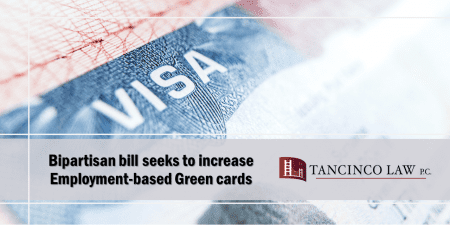The delay in the processing of visa benefits applications with the U.S. Citizenship and Immigration Services (USCIS) has reached a critical level that’s affecting U.S citizen families and employers filing visas on behalf of their relatives and employees, respectively. Last month, U.S. Congressional Representatives led by Rep. Jesus G. “Chuy” Garcia (D-IL) sent a letter to the USCIS Director Lee Francis Cissna demanding accountability on the current delays in the adjudication of visa petitions and other applications. What is causing the delay and what actions can we take to help address this issue?
Many years back, specifically in 2004, an applicant for naturalization will have to wait for 14 months before s/he is called for an interview. To address the increasing delay in the processing of applications, the USCIS created the “Backlog Elimination Program” with the purpose of working smarter and eliminating redundancies in the adjudications of visa petitions and applications. At that time the number of backlog of cases was approximately 1.7 million. After 2 years of implementing the Backlog Elimination Program, the processing time for naturalization applications was reduced from 14 months to 5 months. In fact, in an election year, such as in the year 2016, the naturalization applications were adjudicated in three months.
In 2017, there were changes in USCIS policies that resulted in processing delays. According to the U.S. Department of Homeland Security, there is now a net backlog exceeding 2.3 million in delayed cases. The study of the American Immigration Lawyers Association (AILA) indicates that number amounts to more than 100% increase over the span of one year. If an applicant for naturalization would notice now, there is an average of 10-19.5 months before the application is adjudicated. Other than naturalization applications, the other visa applications that are suffering from processing delays are the petitions for immediate relatives (I-130); applications for employment authorization (I-765) and applications for adjustment of status(I-485).
A spouse of a U.S. citizen applying for lawful permanent resident must now wait at least 17.5 months before the spouse is called for the interview on the I-130 and 485 application. An employment authorization document application is taking now at least 4 to 6 months if it is based on adjustment application. Other basis for applications for employment authorization now take anywhere from 6.5 to 8.5 months before being adjudicated and released.
While historically, staffing levels and volume of cases received at the USCIS are contributory to the delay, shift in policies being implemented by USCIS now have the same effect. DHS stated in its report to Congress in 2018 that “policy shifts” are factors influencing its diminished per hour case completion rate. One of the changes in policies are the elimination of the long standing deference policy which gives deference to prior determinations involving the same employer and same position. Now the USCIS is assessing and re-examining prior approved cases. Other policy changes are the (1)requirement for a domestic interview for employment-based petition; (2) adopting extreme vetting security protocols (even if existing screening measures are adequate) and (3) adding enforcement duties to USCIS officers under the new NTA policy where an adjudicating officer is required to issue Notices to Appear to individuals with denied petitions. Undeniably, diversion of resources from adjudication to enforcement could slow down case processing.
These delays had adversely affected applicants, their families and their employers – resulting in job losses, inability to travel internationally for important family and business events or simply the inability to obtain social security numbers and driver’s licenses.
USCIS is an agency created by Congress, hence, it is just appropriate that it remains accountable for the delays in adjudication. Affected U.S. citizen businesses and families and immigrant advocates must contact their congressional representatives and urge them to direct USCIS to focus on its service oriented purpose as an agency, create a backlog elimination program and remove enforcement functions to resolve this critical issue of adjudication delays.
(Atty. Lourdes Santos Tancinco, Esq. is a San Francisco based immigration attorney and an immigrant rights advocate. She may be reached at 1 888 930 0808, law@tancinco.com or facebook.com/tancincolaw, or through this website tancinco.weareph.com/old)


